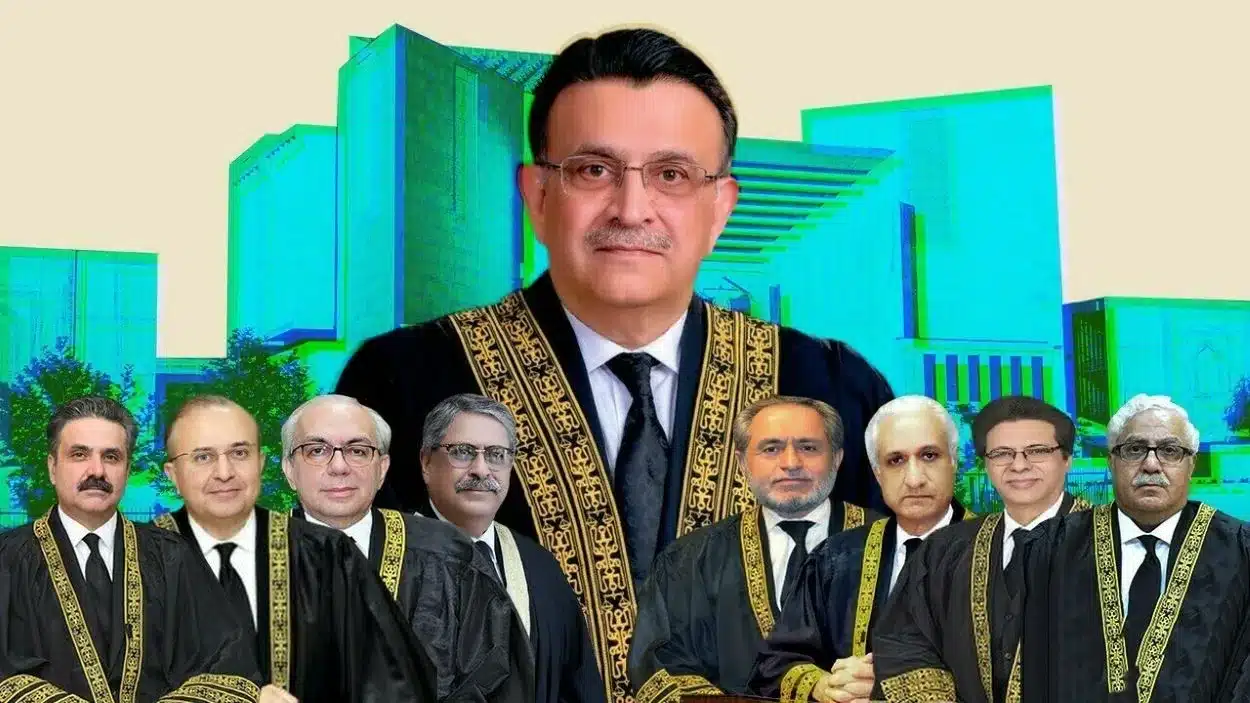The relationship between Pakistani politics and the Supreme Court of Pakistan has been historically complex and tense.
The Supreme Court, as the highest judicial institution in Pakistan, is responsible for interpreting the Constitution, ensuring the rule of law, and maintaining a system of checks and balances. However, the court has faced numerous challenges in its attempts to remain independent from the political sphere. Some reasons for this behavior include the following:
Corruption and Accountability: Corruption has been pervasive in Pakistan’s political system, and the Supreme Court has sometimes taken a strong stand against it. The court has pursued cases against high-profile politicians, which has led to tensions between the judiciary and political factions.
Political Interference: One of the primary issues that have plagued the relationship between Pakistani politics and the Supreme Court is political interference. Throughout Pakistan’s history, the government and the military have often pressured the court to make decisions in their favor, undermining the judiciary’s independence.
Judicial Activism: In response to political interference, the Supreme Court has occasionally adopted an activist role, asserting its authority over political matters to protect the Constitution and maintain the rule of law. This activism has been met with mixed reactions, as some argue that it is necessary to ensure justice, while others criticize the court for overstepping its bounds.
Military Influence: The military has significantly shaped Pakistan’s political landscape, with several instances of martial law and coups. In such situations, the Supreme Court has sometimes legitimized military rule by providing legal justification, further complicating its relationship with political actors.
Judicial Appointments: Political considerations have often influenced the appointment of judges to the Supreme Court. As a result, the court’s independence has been compromised, and public confidence in the institution has suffered.
Notable Cases of Pakistani Political Leaders Rejecting Supreme Court Verdicts
There have been instances where Pakistani political leaders have rejected or criticized Supreme Court verdicts. Some notable cases include:
- Nawaz Sharif’s disqualification in 2017: The Supreme Court disqualified then-Prime Minister Nawaz Sharif from holding public office in the Panama Papers case. Sharif and his party, the Pakistan Muslim League-Nawaz (PML-N), rejected the verdict, claiming it resulted from a conspiracy against him and his government. In addition, they argued that the decision was politically motivated and unfair.
- Asif Ali Zardari’s Swiss cases in 2012: The Supreme Court ordered then-Prime Minister Yousuf Raza Gilani to write a letter to Swiss authorities to reopen corruption cases against then-President Asif Ali Zardari. Gilani, a Pakistan Peoples Party (PPP) member, refused to comply with the court’s order, arguing that the president enjoyed immunity under the Constitution. The Supreme Court later found Gilani in contempt of court, leading to his disqualification from office.
- The Memogate scandal in 2011: The Supreme Court formed a judicial commission to investigate the Memogate scandal, involving a secret memo allegedly sent by the then-Pakistani Ambassador to the United States, Hussain Haqqani, to US officials seeking their help to prevent a potential military coup in Pakistan. Some political leaders, particularly those affiliated with the PPP, criticized the court’s decision to investigate the matter, arguing that it was overstepping its constitutional boundaries.
- The National Reconciliation Ordinance (NRO) case in 2009: The Supreme Court declared the NRO, an ordinance that granted amnesty to politicians and bureaucrats accused of corruption, as unconstitutional. Many politicians, particularly those from the PPP, criticized the verdict as politically motivated and an attempt to weaken their party.
It is essential to note that these instances often involve complex political dynamics and motivations. Political leaders’ rejection of Supreme Court verdicts can have significant implications for Pakistan’s democratic institutions, the rule of law, and political stability.
Reasons for Pakistani Political Leaders Rejecting Supreme Court Verdicts
It is essential to note that these instances often involve complex political dynamics and motivations. The rejection of Supreme Court verdicts by political leaders can have significant implications for Pakistan’s democratic institutions, the rule of law, and political stability.
There are instances where political leaders in Pakistan might reject or criticize Supreme Court verdicts that do not turn out in their favor. Some reasons for this behavior include the following:
- Perceived Bias or Unfairness: Political leaders may feel that the verdict is biased, unfair, or politically motivated. They might argue that the judiciary has been influenced by rival political factions, external forces, or other factors that could compromise the fairness of the judgment.
- Protecting Political Interests: Leaders may reject unfavorable verdicts to safeguard their political or party interests. Publicly criticizing or rejecting a verdict can be a way to rally support and maintain the loyalty of their voter base, especially if they believe the judgment is detrimental to their political agenda or reputation.
- Undermining Opponents: By rejecting a Supreme Court verdict, political leaders can attempt to undermine the credibility of their opponents or the judicial system itself. This tactic can cast doubt on the fairness of the legal process and create a narrative that suits their political objectives.
- Challenging the Verdict Through Legal Means: Political leaders may reject a verdict to pursue further legal recourse, such as filing an appeal or reviewing the judgment. This approach might be taken if they genuinely believe the decision is incorrect or unjust and want to exhaust all legal avenues.
It is important to note that the reasons behind a political leader’s rejection of a Supreme Court verdict may vary and could be a combination of multiple factors. However, rejecting a verdict can have significant consequences for the stability of the country’s democratic institutions and may lead to tensions between different branches of government.
Despite these challenges, the Supreme Court of Pakistan has tried to uphold the rule of law and protect the rights of citizens. Efforts to strengthen the judiciary’s independence and reduce political interference are crucial to ensuring a healthy balance of power between the branches of government in Pakistan.






